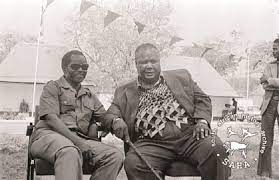High Court stops July Moyo from meddling in council affairs

The High Court has set aside Section 314 of the Urban Councils Act Chapter 29:15, declaring it unconstitutional as it allowed the Minister of Local Government and Public Works to interfere with the running of local authorities.
This ‘historic’ decision comes at a time when Zanu PF local government ministers, in this instance current minister, July Moyo, are always at odds with opposition-dominated councils over allegations that they usurp their authority and frequently issue disastrous orders.
Section 314 of the Urban Councils Act Chapter 29:15 was deemed unconstitutional, as it gave the Local Government Minister too much power as it empowered him to “reverse, suspend, rescind resolutions of Councils.”
The particular section reads: “(1) Where the minister is of the view that any resolution, decision, or action of a council is not in the interests of the inhabitants of the council area concerned or is not in the national or public interest, the Minister may direct the council to reverse, suspend or rescind such resolution or decisions or reverse or suspend such action.
“(2) Any direction of the minister in terms of subsection (1) to a council shall be in writing.
“(3) The council shall, with all due expedition, comply with any direction given to it in terms of subsection (1).”
The landmark ruling was delivered by Judge Nyaradzo Priscilla Munangati-Manongwa in a matter between the Combined Harare Residents Association, Borrowdale Residents and Ratepayers Association, Clever Rambanepasi, Ian Makone and Elvis Ruzani versus the Minister of Local Government.
The applicants were represented by Tendai Biti while the Minister of Local Government was represented by a Machingauta.
On behalf of the applicants, Biti contended the Local Government Minister had taken over the running of councils yet he is not an elected councillor, while the minister responded that the local government ministry could not be complacent when local governments made bad decisions that had a negative impact on the affairs of residents.
The Minister of Local Government also questioned the applicants’ locus standi, claiming that the residents’ associations were ratepayers with no legal standing.
However, in her decision, the Judge stated that the minister’s reasons were irrelevant and hence could not stand.
She also dismissed submissions that the applicants were ratepayers for lacking merit and ordered as follows:
“Section 314 of the Urban Council Act Chapter 29:15 is ultra vires the provisions of Sections 264 (2) 265 (1) and (2), 274 and 276 (1) of the Constitution of Zimbabwe and is hereby declared invalid,” Munangati-Manongwa said, adding the respondent is to pay costs.
“The court is cognisant of the further progression of the matter vis confirmation of the order in terms of Section 175 of the Constitution as read with Section 31 of the Constitutional Court Rules.”
According to the constitution, local authorities have clear powers and allowing the Minister of Local Government to interfere with those powers was outside the supreme law, meaning Section 314 violated the constitutional provisions of Section 276 on the functions of Urban Local authorities and also violated devolution as specified in Section 264 to 265.






